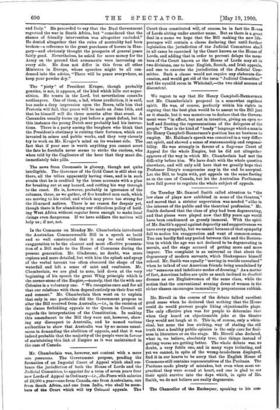We regret to say that Sir Henry Campbell-Bannerman met Mr.
Chamberlain's proposal in a somewhat captious spirit. He was, of course, perfectly within his rights in arguing that the best plan would be to assent to the Bill just as it stands, but it was monstrous to declare that the Govern- ment were "in effect, but not in intention, giving an open re- buff and flouting the representations of the delegates of the people." That is the kind of " heady " language which a man in Sir Henry Campbell-Bannerman's position has no business to employ. Mr. Haldane's speech was conceived in a very differ- ent spirit, and showed a sense of statesmanship and responsi- bility. He was strongly in favour of a Supreme Court of Appeal for the whole Empire, bat he did not altogether approve of the way in which Mr. Chamberlain had met the difficulty before him. We have dealt with the whole question elsewhere, and will only add here that we greatly hope that Professor Dicey's compromise may in the end be accepted. Let the Bill, to begin with, put appeals on the same footing as in the case of Canada, but let the Australian Parliament have full power to regulate the whole subject of appeals.






































 Previous page
Previous page